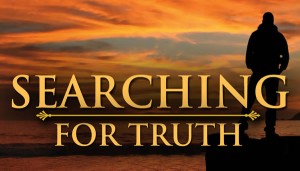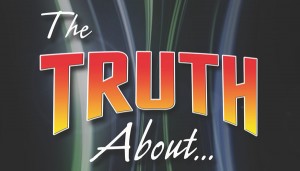To many people today, like atheist Richard Dawkins, faith “means blind trust, in the absence of evidence, even in the teeth of evidence” (from The Selfish Gene, as quoted in McGrath’s Conclusion). But as we have seen the last few weeks, this view of faith is far removed from Einstein’s view of mystery, much less the ideal of faith as revealed in Scripture. To begin with, the harmony of faith and reason is self-evident throughout the Bible, though rarely stated in explicit terms.
In the Old Testament, for example, wisdom is integrally connected with a deep, personal knowledge of Yahweh as Creator and Redeemer: “The fear of the LORD is the beginning of wisdom, and the knowledge of the Holy One is insight” (Pro 9:10 ESV). As is often stated by students of Judaism, while ancient philosophy and mythology reflect a human search for the divine, the Hebrews knew the Lord and understood wisdom in relation to him. Thus, knowing him as Creator and Redeemer determines what is considered reasonable, even on spiritual matters, such as forgiveness: “Come now, let us reason together, says the LORD: though your sins are like scarlet, they shall be as white as snow; though they are red like crimson, they shall become like wool” (Isa 1:18, all emphases added).
The New Testament maintains this same focus on reasonable faith by pointing to the objective, historical nature of revelation. As the Hebrews writer explains, “Now faith is the substance of things hoped for, the evidence of things not seen” (Heb 11:1 NKJV). So while faith requires the believer to take God at his word, it does not mean that all evidence is unavailable or unimportant. Instead, the evidence that exists is enough to convince a reasonable seeker that God tells the truth, and can therefore be trusted even when the thoughts of man have not caught up with the foreknowledge of God. As disciples of Christ, then, we are commanded not to accept whatever teaching comes our way, but instead to “test everything” by the standard of God’s word; and to “hold fast what is good. Abstain from every form of evil” (1Th 5:21-22 ESV; see Acts 17:11; 1Jo 4:1-3).
Luke draws on this principle of evidence twice in relation to Christ’s resurrection. In Acts 1:3, he states that Jesus, “presented himself alive to [the disciples] after his suffering by many proofs, appearing to them during forty days and speaking about the kingdom of God.” And later, he recounts Paul’s use of the Greek word pistes (usually translated as faith) in the philosophical sense, declaring that God will judge the world through Christ, “and of this he has given assurance [pistes] to all by raising him from the dead” (Acts 17:31). Taken together, the apostles said neither, “You’ll just have to believe me,” nor “Seeing is believing,” but instead pointed to sound testimony: “We have seen these things; come and hear what we have seen.”
Paul therefore points to the veracity of the eyewitnesses to Jesus’ resurrection: Christ “appeared to Cephas, then to the twelve. Then he appeared to more than five hundred brothers at one time . . . . Then he appeared to James, then to all the apostles. Last of all, as to one untimely born, he appeared also to me” (1Co 15:5-8). Forty years later, John’s testimony is even more vivid: “That which was from the beginning, which we have heard, which we have seen with our eyes, which we looked upon and have touched with our hands, concerning the word of life . . . that which we have seen and heard we proclaim also to you” (1Jo 1:1-3). Faith in the resurrection of Christ was a matter of sight for the first generation of disciples, but for all believers since, the Christian faith is a matter of weighing and accepting their accounts as valid and reasonable testimony.
But this connection between faith and reason cuts both ways: just as biblical faith is inherently reasonable, the thoroughgoing naturalism of the modern world fails to grasp the comprehensive nature of truth and persuasion. As C.S. Lewis writes, naturalism “offers what professes to be a full account of our mental behaviour; but . . . leaves no room for the acts of knowing or insight on which the whole value of our thinking, as a means to truth, depends” (Miracles 27). So while reason is often appealed to these days as the final authority on everything, its own existence demands an explanation outside of visible nature. Lewis continues, “The Naturalists have been engaged in thinking about Nature. They have not attended to the fact that they were thinking. The moment one attends to this it is obvious that one’s own thinking cannot be merely a natural event, and that therefore something other than Nature exists” (Miracles 65).
As Lewis points out elsewhere, there is a Tao (or Way) that is accessible to all and serves as the basis for all human reasoning. “It is the doctrine of objective value, the belief that certain attitudes are really true, and others are really false, to the kind of thing the universe is and the kind of things we are” (Lewis, Abolition 18). And the Apostle Paul agrees, writing that even those who live without the benefit of Scripture can understand there is a God, reorient their lives toward him, and be judged for failing to do so: “For his invisible attributes, namely, his eternal power and divine nature, have been clearly perceived, ever since the creation of the world, in the things that have been made. So they are without excuse” (Rom 1:20). So by living in a world that actually exists and among people actually capable of reason, man can utilize his common sense to recognize this Way and live by it.
So whether we refer to it as reasonable faith or common sense, or “Natural Law or Practical Reason or the First Platitudes,” truth exists and must be believed as true in order for reasoning to be possible (Abolition 43). Or as Lewis states earlier with even greater brevity, “If nothing is self-evident, nothing can be proved” (Abolition 40). As Einstein himself knew, rationality itself depends on an objective reality and meaning outside of, and independent of, human thought. And if we cannot even agree on the fundamental facts of reality, reason becomes a mere exercise in futility. Rationalism aside, then, reason is not the beginning of true philosophy, but rather faith. As another theological great writes, “Reason is itself a matter of faith. It is an act of faith to assert that our thoughts have any relation to reality at all” (Chesterton 29).
Understood and applied biblically, then, the Christian faith is not the irrational, unthinking thing that popular polemicists would like to make it. Instead, it starts with the exact same premise as modern science: that the world has a natural order built into it, which is itself intelligible to mankind, and is discernible through the careful application of reason. But Christianity also doesn’t stop here. It sees the order and intelligibility of the universe as a pointer to another world, or another plane of reality; to something—or rather Someone—else who is responsible for it all, and who transforms our understanding of even the mundane; where both faith and reason are raised to a higher level of thought and existence.
Works Cited
- Chesterton, G.K. Orthodoxy. New York: Dodd, Mead, 1908. Print.
- The ESV Study Bible. Ed. Lane T. Dennis & Wayne Grudem. Wheaton: Crossway, 2008. Bible Study with Accordance.
- Lewis, C.S. The Abolition of Man. HarperCollins, 1974. Print.
- —. Miracles. New York: HarperCollins, 1947. Print.
- McGrath, Alister E. Surprised by Meaning: Science, Faith, and How We Make Sense of Things. Louisville, KY: Westminster John Knox, 2011. iBooks.
Cross-posted from In His Image.





